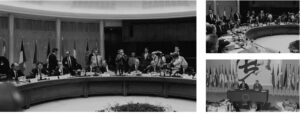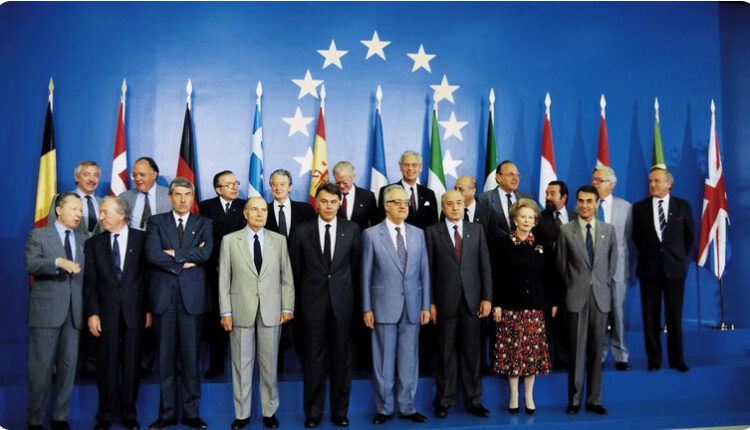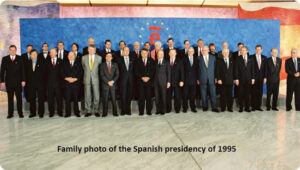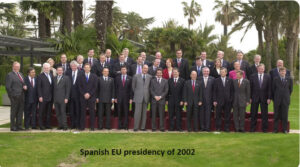The name “euro” and the Schengen Area, are milestones of the Spanish presidencies of the Council of the European Union.
The name “euro”, the Schengen Area, and the further enlargement of the EU are highlights of Spain’s four presidencies of the Council of the European Union.
The presidency of the Council of the EU rotates among the member states, and the four presidencies held so far by Spain were in 1989, 1995, 2002, and 2010.
Spain debuts in 1989
The first time Spain took its turn to take charge of EU affairs was on 1 January 1989, when the EU was made up of twelve countries.
This date was just three years after Spain’s accession to the European Communities (1986), a short period of time in which the country had already demonstrated its “enthusiasm and [the] seriousness that Europe needed”, in the words of the then president of the government of Spain, Felipe González.
One of the main achievements during this period was the decision at the Madrid Summit to initiate the first phase of the creation of the Economic and Monetary Union, a fundamental step that would eventually lead to the establishment of a common currency 12 years later.
Three directives on occupational safety and security were adopted during this presidency and important progress was made on the Common Agricultural Policy, with the completion of the reforms initiated by the Greek presidency on the approval of agricultural prices and the launch of the first forestry programme.
Another of Spain’s major contributions was the launch of the idea of economic and social cohesion, which was fundamental to compensate for the deficiencies of the poorest countries in the internal market, and which would later give shape to the Cohesion Funds.
 In 1995, Spain would once again lead the Council of the European Union
In 1995, Spain would once again lead the Council of the European Union
Six years after its first presidency, Spain returned to the helm of the EU.
It came at a crucial time for the bloc, as three new members (Austria, Sweden, and Finland) had just joined, and a process of reflection was underway that led to the signing of the Treaty of Amsterdam in 1997.
Furthermore, on 26 March 1995, another of the major achievements of the community project was put into operation in seven member states: the Schengen Area (in 2021, it was in force in 26 countries), which involved the removal of internal border controls and obstacles to allow the free movement of people and goods.
During this presidency, or more precisely at the Madrid European Council in December, it was decided to christen the single currency with the name ‘euro’, and the EU’s relations with the Mediterranean countries were boosted with the signing of the Barcelona Declaration, which is the origin of the Union for the Mediterranean.
Third presidency in 2002, which saw the EU’s largest-ever enlargement of its membership
Spain again took over the presidency of the council at a momentous time for the EU, giving the go-ahead to the largest enlargement of its membership since its creation, and thereby seeing the number of Member States increase from 15 to 27.
Under Spanish leadership, the single currency again came to the fore. On 1 January, the very day the Spanish semester started, the euro was introduced in 12 countries, including Spain.
Due to the crisis resulting from the 9/11 attacks in the US, Spain included the fight against transnational terrorism among its priorities, and important advances were made in the framework of the area of freedom, security, and justice. A prominent example was the adoption of the European arrest warrant, known as the Euro order.
The economic crisis marks the fourth Spanish presidency in 2010
The economic crisis, affecting all EU Eurozone countries, marked the fourth presidency, in which Spain set itself the objective of promoting economic recovery through sustainable growth that would generate employment.
The entry into force of the Lisbon Treaty – the last of the major reforms of EU law, on 1 December 2009 – meant that it fell to Spain, for the first time, to implement many of its provisions.
Many of its innovations were related to the development of a Common Foreign and Security Policy, which allows the EU to assert its voice and amplify its values and interests on the international stage.




Comments are closed.